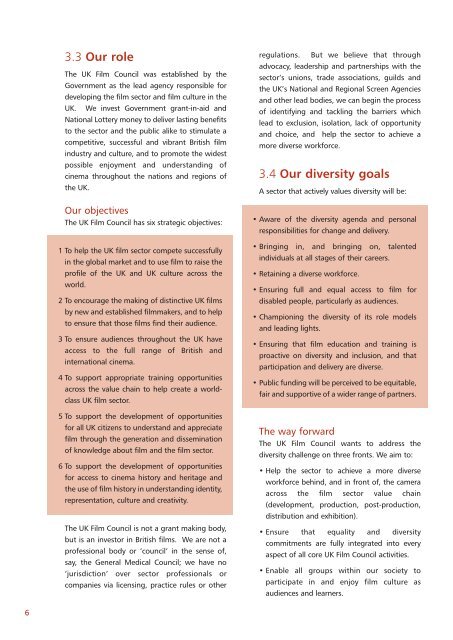Success through diversity and inclusion - BFI - British Film Institute
Success through diversity and inclusion - BFI - British Film Institute
Success through diversity and inclusion - BFI - British Film Institute
Create successful ePaper yourself
Turn your PDF publications into a flip-book with our unique Google optimized e-Paper software.
6<br />
3.3 Our role<br />
The UK <strong>Film</strong> Council was established by the<br />
Government as the lead agency responsible for<br />
developing the film sector <strong>and</strong> film culture in the<br />
UK. We invest Government grant-in-aid <strong>and</strong><br />
National Lottery money to deliver lasting benefits<br />
to the sector <strong>and</strong> the public alike to stimulate a<br />
competitive, successful <strong>and</strong> vibrant <strong>British</strong> film<br />
industry <strong>and</strong> culture, <strong>and</strong> to promote the widest<br />
possible enjoyment <strong>and</strong> underst<strong>and</strong>ing of<br />
cinema <strong>through</strong>out the nations <strong>and</strong> regions of<br />
the UK.<br />
Our objectives<br />
The UK <strong>Film</strong> Council has six strategic objectives:<br />
1 To help the UK film sector compete successfully<br />
in the global market <strong>and</strong> to use film to raise the<br />
profile of the UK <strong>and</strong> UK culture across the<br />
world.<br />
2 To encourage the making of distinctive UK films<br />
by new <strong>and</strong> established filmmakers, <strong>and</strong> to help<br />
to ensure that those films find their audience.<br />
3 To ensure audiences <strong>through</strong>out the UK have<br />
access to the full range of <strong>British</strong> <strong>and</strong><br />
international cinema.<br />
4 To support appropriate training opportunities<br />
across the value chain to help create a worldclass<br />
UK film sector.<br />
5 To support the development of opportunities<br />
for all UK citizens to underst<strong>and</strong> <strong>and</strong> appreciate<br />
film <strong>through</strong> the generation <strong>and</strong> dissemination<br />
of knowledge about film <strong>and</strong> the film sector.<br />
6 To support the development of opportunities<br />
for access to cinema history <strong>and</strong> heritage <strong>and</strong><br />
the use of film history in underst<strong>and</strong>ing identity,<br />
representation, culture <strong>and</strong> creativity.<br />
The UK <strong>Film</strong> Council is not a grant making body,<br />
but is an investor in <strong>British</strong> films. We are not a<br />
professional body or ‘council’ in the sense of,<br />
say, the General Medical Council; we have no<br />
‘jurisdiction’ over sector professionals or<br />
companies via licensing, practice rules or other<br />
regulations. But we believe that <strong>through</strong><br />
advocacy, leadership <strong>and</strong> partnerships with the<br />
sector’s unions, trade associations, guilds <strong>and</strong><br />
the UK’s National <strong>and</strong> Regional Screen Agencies<br />
<strong>and</strong> other lead bodies, we can begin the process<br />
of identifying <strong>and</strong> tackling the barriers which<br />
lead to exclusion, isolation, lack of opportunity<br />
<strong>and</strong> choice, <strong>and</strong> help the sector to achieve a<br />
more diverse workforce.<br />
3.4 Our <strong>diversity</strong> goals<br />
A sector that actively values <strong>diversity</strong> will be:<br />
• Aware of the <strong>diversity</strong> agenda <strong>and</strong> personal<br />
responsibilities for change <strong>and</strong> delivery.<br />
• Bringing in, <strong>and</strong> bringing on, talented<br />
individuals at all stages of their careers.<br />
• Retaining a diverse workforce.<br />
• Ensuring full <strong>and</strong> equal access to film for<br />
disabled people, particularly as audiences.<br />
• Championing the <strong>diversity</strong> of its role models<br />
<strong>and</strong> leading lights.<br />
• Ensuring that film education <strong>and</strong> training is<br />
proactive on <strong>diversity</strong> <strong>and</strong> <strong>inclusion</strong>, <strong>and</strong> that<br />
participation <strong>and</strong> delivery are diverse.<br />
• Public funding will be perceived to be equitable,<br />
fair <strong>and</strong> supportive of a wider range of partners.<br />
The way forward<br />
The UK <strong>Film</strong> Council wants to address the<br />
<strong>diversity</strong> challenge on three fronts. We aim to:<br />
• Help the sector to achieve a more diverse<br />
workforce behind, <strong>and</strong> in front of, the camera<br />
across the film sector value chain<br />
(development, production, post-production,<br />
distribution <strong>and</strong> exhibition).<br />
• Ensure that equality <strong>and</strong> <strong>diversity</strong><br />
commitments are fully integrated into every<br />
aspect of all core UK <strong>Film</strong> Council activities.<br />
• Enable all groups within our society to<br />
participate in <strong>and</strong> enjoy film culture as<br />
audiences <strong>and</strong> learners.

















